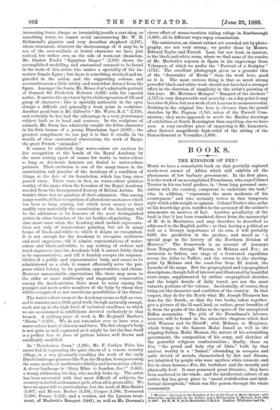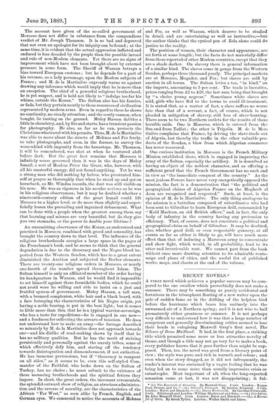BOOKS.
THE KINGDOM OF FEZ.*
HERE we have a remarkable book on that partially explored north-west corner of Africa which still exhibits all the phenomena of low barbaric government. In the first place, it is the work of an accomplished Frenchman, who, says Colonel Trotter in his too brief preface, is, "from long personal asso- ciation with the country, competent to undertake the task," who, in addition, "represents the more moderate of his countrymen," and who certainly writes in that temperate style which adds weight to opinion. Colonel Trotter also, so far as his knowledge goes, testifies to the accuracy of the author's statements on matters of fact. Another peculiarity of the book is that it has been translated direct from the manuscript. of M. de la Martiniere, and may therefore be described as addressed to the English public ; so that, having a political as well as a literary importance of its own, it will probably fulfil the prediction in the preface, and stand as " a special page in the history of the Northern division of. Morocco."' The framework is an account of journeys. from Tangiers, through Wazzan, to Meknas and Fez ; an excursion to Safrou, one stage of a frustrated expedition across the Atlas to Tafilet ; and the return to ,the starting- point by Meknas and the coast-line from El Araish, the. Larache of the maps. But the geographical and topographical descriptions, though full of interest and illustrated by beautiful route-maps, supplemented by outline orographical sketches. and the bright details of daily travel, are not the most valuable portions of the volume. Incidentally, of course, they bring out the character and condition of the country. In that respect, they do for the North what Mr. Joseph Thomson has done for the South ; so that the two books, taken together, give a picture of the ill-used land, or rather, great breadths of it, from the peaks of the Atlas to the spurs of the unexplored: Riffan mountains. The pith of the Frenchman's labours,. however, will be found in the attractive chapters which deal. with Wazzan and its Sheriff ; with Meknas, or Mequinez, which brings in the famous Mulai Ismail as well as the. reigning Sultan, Mulai Hassan, the nature of his astonishing government, the composition of his army, and sketches of the powerful religious confraternities ; finally, those on Fez, " the proud and holy city of Idris," built by that ancient worthy in a " funnel," abounding in mosques- and quite devoid of morals, characterised by dirt and disease,. yet inhabited by people who wear spotless white raiment, and. live in clean houses,—Fez, the turbulent and the morally and physically foul. It once possessed great libraries; they have- been scattered to the winds ; and the intellectual culture of• an, earlier day has given place to "moral stultification and intel- lectual decrepitude," which run like poison through the whole- community.
* Morocco : Journeys in the Kingdom of Fez to the Court of Mulai Hassan; with Itineraries constructed by the Author, and a Batiography of Morocco, from 18441 to 1887. By H. M, P, de la Martiniere, E.R.G.S. London; Whittaker and Co. The account here given of the so-called government of Morocco does not differ in substance from the compendious verdict of Mr. Joseph Thomson. It is so bad and depraved that not even an apologist for its iniquity can be found ; at the same time, it is evident that the actual oppression inflicted and endured is less dreaded by the people than the possible inroad and rule of non-Moslem elements. Yet there are no signs of improvement which have not been brought about by external pressure in some form. The Sheriff of Wazzan betrays a bias toward European customs ; but he depends for a part of his revenue, as a holy personage, upon the Moslem subjects of France ; and M. de la Martiniere expressly warns us against drawing any inference which would imply that he is more than an exception. The chief of a powerful religious brotherhood, he is yet suspect, and is held not likely to " indulge too far his whims, outside the Koran." The Sultan also has his fancies, or fads, but they pertain mostly to those resources of civilisation represented by modern arms. Even in regard to these he shows no continuity, no steady attention ; and the costly cannon, when bought, lie rusting on the ground. Muley Hassan dabbles a little in chemistry, and, by fits and starts, has a transient passion for photography. He also, as far as he can, protects the Christians who travel with his permits. Thus, M. de la Martiniere was able to move about the streets of Meknas and Fez freely, to take photographs, and even, in the former, to survey the womenkind with impunity from the housetops. Mr. Thomson, it will be remembered, was shot at when he ventured aloft before dark. But the great fact remains that Morocco is infinitely worse governed than it was in the days of Muley Ismail, a sort of Moslem Peter the Great, who, however, with all his masterful energy, did not found anything. Yet he was a strong man who did nothing by halves, who prostrated him- self at prayer so thoroughly that when he stood up and got on horseback, as Mr. Windus records, the dust was still visible on his nose. He was as vigorous in his secular actions as he was in his religious observances ; but it may be doubted whether a nineteenth-century edition of the great Ismail could lift Morocco to a higher level, or do more than slightly and super- ficially lessen the prevailing and ingrained debasement. What can be-done with a people when the greatest among them say that learning and science are very beautiful, but do they give you two stomachs, or the power to double your lifetime ?
An unremitting observance of the Koran, as understood and practised in Morocco, combined with greed and sensuality, has brought the country down to that level. The influence of the religious brotherhoods occupies a large space in the pages of the Frenchman's book, and he seems to think that the general degradation is due to the theocracy and the Negro blood im- ported from the Western Soudan, which has to a great extent diminished the Arabian and subjected the Berber elements. There are twenty-one religious orders in Morocco, or nearly one-fourth of the number spread throughout Islam. The Sultan himself is only an affiliated member of the order having its headquarters in Wazzan, and he would find it impossible to set himself against these formidable bodies, which he could not avoid were he willing and able to insist on a just and fruitful system of government. Maley Hassan, a tall man, with a bronzed complexion, white hair and a black beard, with a face betraying the characteristics of his Negro origin, yet having a noble bearing, is put in the best light; but it comes to little more than this, that he is a typical warrior-sovereign, who has a taste for expeditions—he is engaged in one now— and a fondness for collecting the arrears of taxation. He does not understand how to make an army—the farrago described so minutely by M. de la Martiniere does not approach towards one—and his dislike of road-making shows by itself that he has no military qualities. But he has the merit of striving persistently and personally against the unruly tribes, some of which effectively defy him, and staving off the tendency towards disintegration and dismemberment, if not extinction. He has immense pretensions, but if " theocracy is rampant on all sides," as it seems to be, even this self-styled Com- mander of the Faithful, who looks down on the Sultan of Turkey, has no choice ; he must submit to the existence of these menacing brotherhoods and the spiritual fetters they impose. In short, the great orders, the incessant ceremonials, the splendid outward show of religion, an atrocious administra- tion and the reverse of morality, are the characteristics of the African "Far West," as seen alike by French, English, and German eyes. We commend to notice the accounts of Meknas and Fez, as well as Wazzan, which deserve to be studied in detail, and are entertaining as well as instructive,—bnt. the author thinks that the cynical pen of Zola alone could do justice to the reality.
The position of women, their character and appearance, are set forth at some length ; but the facts do not materially differ from those reported of other Moslem countries, except that they are a shade darker. On slavery there is general information. of a similar kind. The slaves come in gangs from the Western Soudan, perhaps three thousand yearly. The principal markets- are at Morocco, Mogador, and Fez ; but slaves are sold by auction in all towns. The Sultan levies a tax, " in kind," on the imports, amounting to 5 per cent. The trade is lucrative,. prices ranging from £2 to £20, the last sum being that brought by "a choice young negress." Sometimes white slaves are sold, girls who have fled to the towns to avoid ill-treatment.. It is stated that., as a matter of fact, a slave suffers no worse fate than that of a servant, a fact, of course, which is not pleaded in mitigation of slavery, still less of slave-hunting.. There seem to be two Northern outlets for the results of these horrible raids. One is Morocco, which is entered from the Sus and from Tafilet ; the other is Tripolis. M. de la Mar- tiniere complains that France, by driving the slave-trade out of Algeria, lost thereby the traffic in the other valuable pro- ducts of the Soudan, a blow from which Algerian commerce has never recovered.
One curious institution in Morocco is the French Military Mission established there, which is engaged in improving the army of the Sultan, especially the artillery. It is described as having an object of the noblest character, and as offering a sufficient proof that the French Government has no such end in view as "the immediate conquest of the country." As the most jealous Powers have never very energetically opposed the mission, the fact is a demonstration that "the political and geographical claims of Algerian France on the Moghreb al Acsa are recognised and respected." Such, at least, is the opinion of M. de la Martiniere. The only thing analogous to the mission is a battalion composed of subordinates who had been sent to Gibraltar to learn European drill, commanded by " Kaid Maclean, an old British officer," and, in fact, the only body of infantry in the country having any pretension to• efficiency. That, of course, does not constitute a political and geographical claim on behalf of Gibraltar. It may be doubted, also, whether good drill, or even respectable gunnery, at all events so far as either is likely to go, will have much more effect than that of inducing a Maroccan army to concentrate and show fight, which would, in all probability, lead to its. utter and irretrievable rout. We cannot part from the book without once more drawing attention to its admirable route- maps and plans of cities, and the useful list of published works, maps, and charts at the end of the volume.



































 Previous page
Previous page